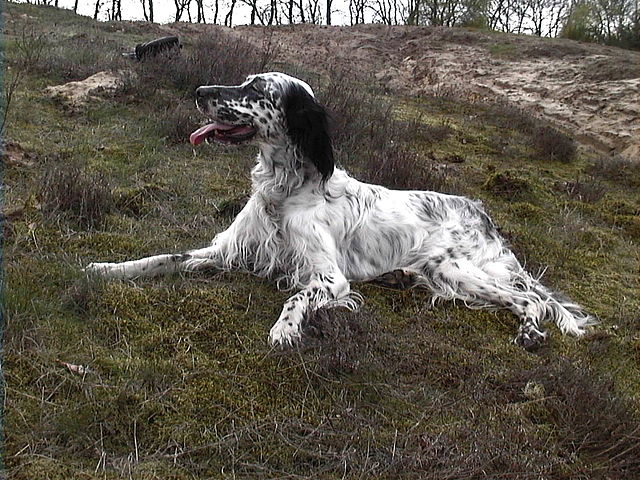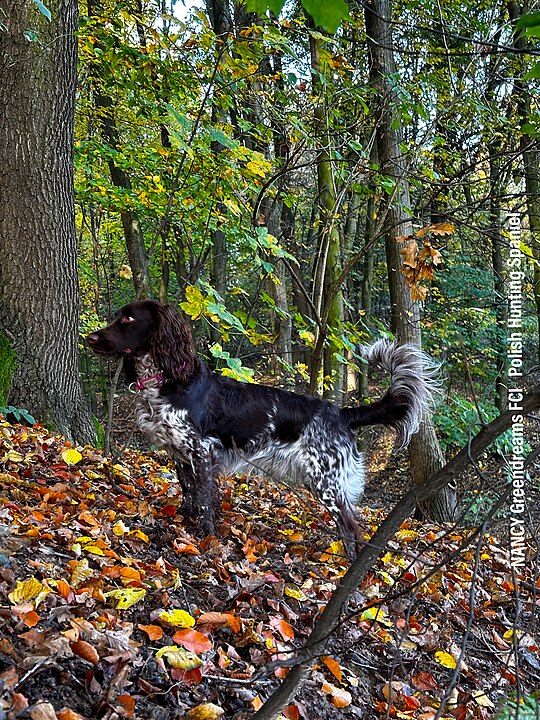The English Setter is one of four breeds from the setter family. Setters are essentially pointing breeds, bred to work with hunters whose quarry is birds. Besides being beautiful, intelligent and great companions for hunting, English Setters are also terrific family dogs. Loyal beyond compare, the breed is completely devoted to their owners.
When it comes to strangers, most are very friendly. Level-headed and dependable, they are also excellent with children. Lastly, the breed standard calls for them to be gentle in temperament at all times. Because they are such good-natured dogs, the English Setter is probably not the first choice for someone searching for a protection dog. They will bark when someone comes to the door, and then normally quiet down once they get the “ok” from their owner that the stranger is welcome. This said, if someone were to break in and threaten their owner, the English Setter might react more aggressively although this would only happen in the most dire of circumstances.
Most English Setters are fairly easy to train, although the more complex commands you teach, the more the difficulty will rise. Although the breed is very smart and learns many things quickly, they are also somewhat independent. They were bred to work with people… but also to make their own decisions while out in the field. This conflict will start to show (in some dogs) when simple commands start turning into more intricate commands. The English Setter has a sensitive nature and should never be trained with unnecessarily harsh techniques. It should be mentioned that males often are more willing to please, while females are more likely to test their owners.
This is not a noisy breed, in fact they are very quiet and mellow in the house. Since English Setters do best inside the house anyway (they are not good kennel dogs or outside-only dogs), this is ideal for most owners as well. The best situation for this breed is to be a house dog with access to a fenced yard (and plenty of time with their owners). It is possible to keep an English Setter in an apartment, but they will need even more exercise in this situation. Whenever out, they need to be kept on-leash because their high prey drive may send them running to the first scampering rodent or flying bird.
When it comes to exercise, like most of the hunting breeds the English Setter does require somewhat vigorous daily “work outs”. A short walk is not enough, this breed needs a minimum of 30 minutes a day of running, jogging, hiking, or any other energetic activity. Think of this breed as an athlete that needs to be regularly conditioned, and you might have an idea of the exercise requirements. A well-exercised and well-trained English Setter can also participate in many different dog activities such as hunting, therapy, obedience, conformation, agility, rally, tracking, and CGC.
The coat of the English Setter does need a lot of care in order to keep it looking nice and free of mats. Coats should be brushed 3-4 times a week, and bathed anywhere from every 2-6 weeks. It is also worth noting that the beautiful patterning of the coat is not completely natural, and will need trimming in order to maintain the “look”. It is also important to keep nails trimmed, teeth cleaned, and ears free of dirt and debris (their ears can be prone to infections if not taken care of properly).
Normally, both male and female English Setters get along well with other dogs. In fact, because they don’t like to be alone it is recommended that they live with another dog if their owner is often at work. While most English Setters would prefer human companionship above all else, another dog can be a good substitute. This breed can also live in harmony with cats and other small pets, but only if the other animals live inside (so as not to trigger their prey drive).
Perhaps their biggest fault is the fact that English Setters like to eat, as well as to chew. They are very orally fixated! The breed can become master counter-surfers, as well as champion trash-diggers, if they think they can get at food. On a different, but related, note they may also chew up small items left around the house. This is where training will come into play! Establish the rules of the house from an early age and this won’t be as much of an issue. Looking for a safe, non-toxic chew option for your English Setter? Check out the Benebone, made with your pet’s safety in mind – https://amzn.to/410F5TG

Affiliate Disclaimer
As an Amazon Associate, I earn from qualifying purchases. This means that if you click on an affiliate link on this site and make a purchase, I may earn a small commission at no additional cost to you. Rest assured that I only link to products I have used, or use on a regular basis, and trust enough to recommend them to you!



